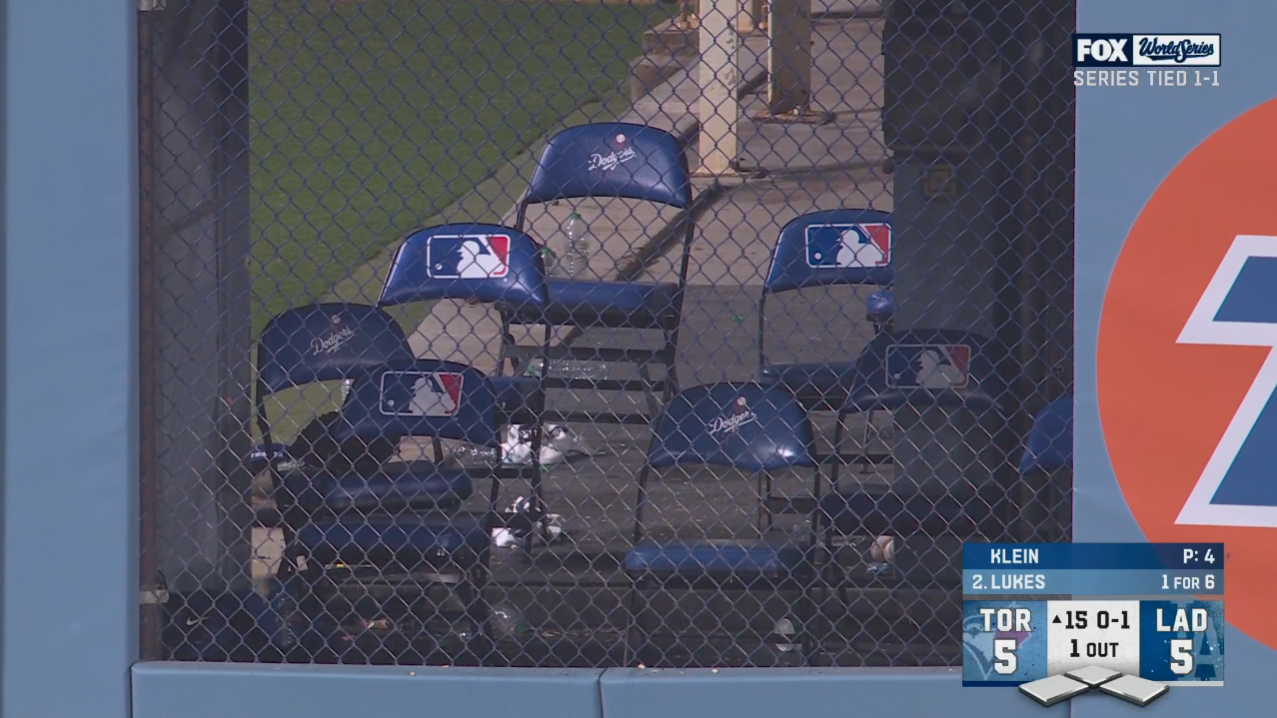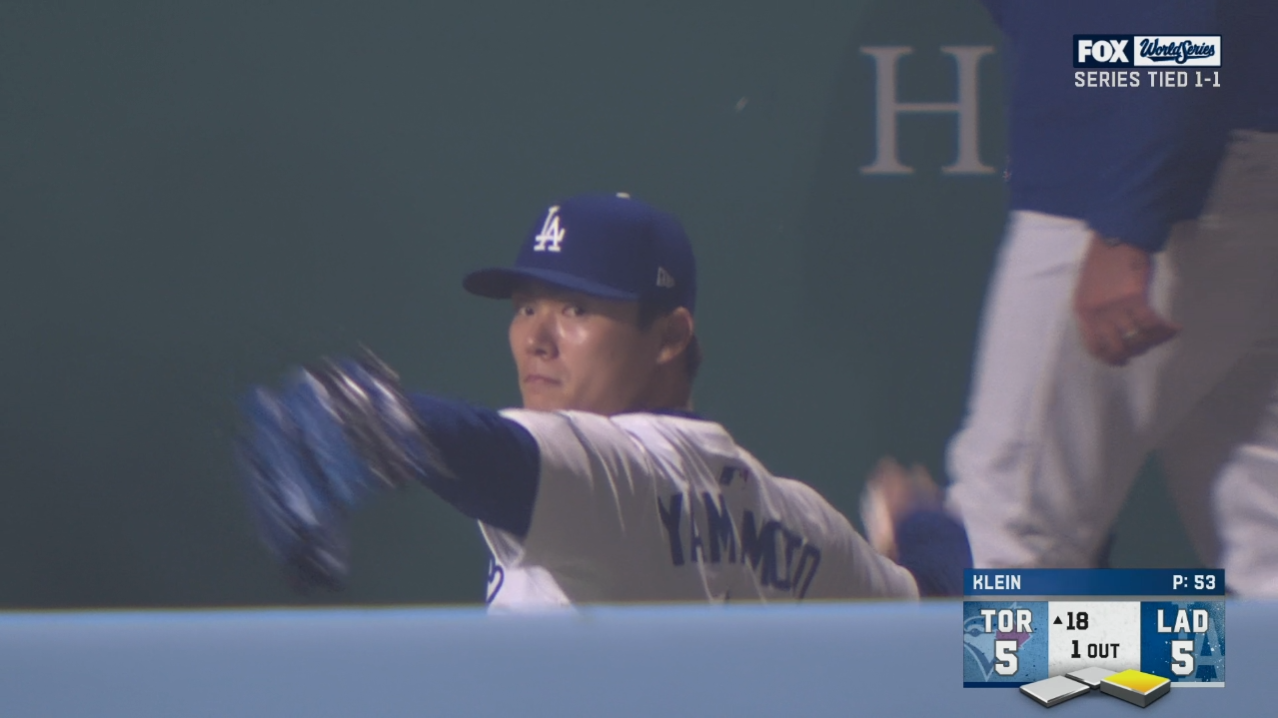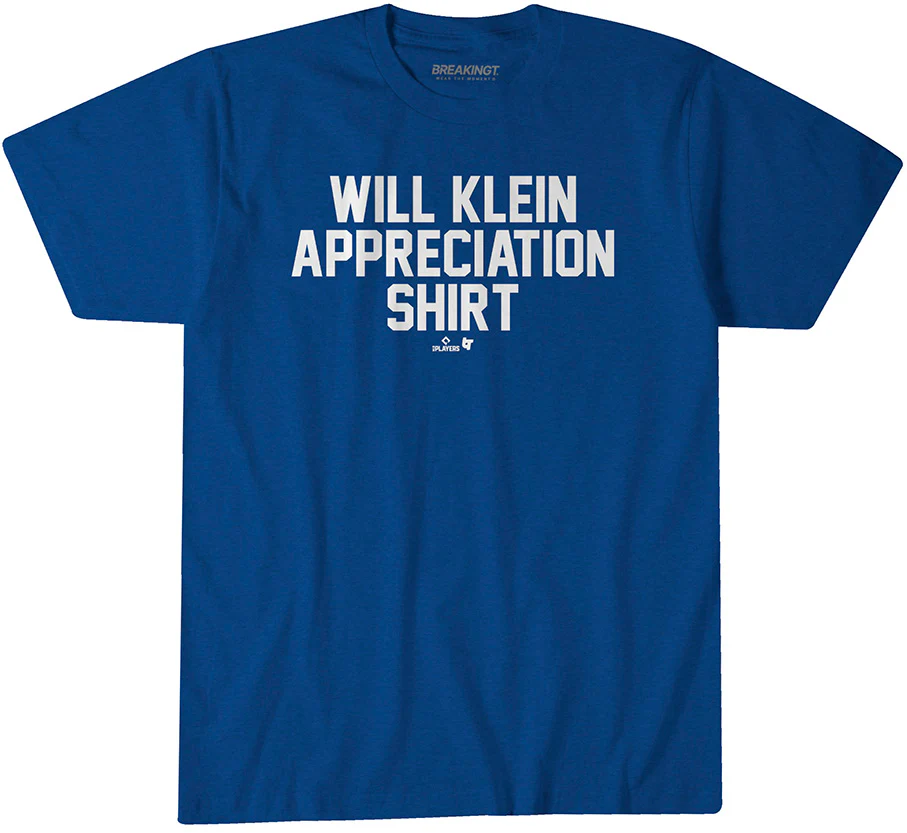On May 31, Will Klein was designated for assignment by the Seattle Mariners. Two days later, the Dodgers acquired him in a trade for 30-year-old minor leaguer Joe Jacques. The Dodgers were Klein’s fourth organization of the past year; the Mariners were the second team to cut him loose. The trade was easy to miss, as the Dodgers’ typical collection of pitcher injuries resulted in a revolving door of minor transactions.
However, one look at Klein revealed that he wasn’t just another warm body. Klein was less than one year removed from being ranked as the Royals’ 17th-best prospect by FanGraphs. Later that season, he was one of the prospects the A’s acquired in exchange for Lucas Erceg. The Dodgers adding Klein was another example of the front office finding a home for interesting arms on the back of the roster. Not all of them stick with the team, but many of them have interesting qualities beyond availability.
Klein’s primary pitch is his four-seam fastball, which sits in the 96-100 MPH range. While the pitch does not have notably high spin, Klein is very good at converting the spin into movement. Paired with his high arm angle, this gives the fastball good foundational characteristics, including strong swinging strike rates up in the zone.
Klein began overhauling his secondary pitches over the offseason, while he was still in Seattle’s organization. The most notable difference was a significant change in his slider’s movement profile, which added tilt and became a sweeper. Klein’s curveball also added vertical depth.
After joining the Dodger organization, Klein continued to tinker. Through the closing months of the season, Klein altered the sweeper, switching to a modified curveball grip. The pitch gained 3mph of velocity while maintaining its shape. In a small sample, Klein’s sweeper now grades 16% above-average by FanGraphs’ Stuff+ model. Klein’s new sweeper needs a complimentary pitch for left-handed batters, which boosts the importance of his curveball. The curve grades as his worst pitch, with swing-and-miss rates trailing its velocity, but other changes to his arsenal keeps it necessary. Klein will still occasionally mix in his old cutter, but by the time he arrived on the mound in the World Series, he was essentially a three pitch pitcher.
Will Klein Talks About the adjustments he made when he came to the Dodgers in terms of his breaking balls. And those adjustments came up HUGE on the BIGGEST stage. #dodgers pic.twitter.com/k09TsLeQfa
— Dodgers Daily (@dodger_daily) October 28, 2025
Klein’s main issue is that he often does not know where the ball is going — he is the prototypical definition of a “live arm.” Like fellow Game 3 hero Edgardo Henriquez, Klein’s pitches often look electric, but the results don’t always follow since he walks too many batters. This profile is often one seen in short bursts, but importantly, Klein had shown the capability to provide some length in the past, going up to three innings in relatively clean minor league outings.
Klein spent most of the summer pitching for the Triple-A Oklahoma City Comets. The change of scenery did not help him find the strike zone: he walked 18 batters in 22 2/3 mediocre innings on his way to a 5.16 ERA. He was still playable due to a ludicrous 42.7% strikeout rate, but he didn’t look like a major leaguer until he found success in a small September hot streak.
Desperate to find relief help, the Dodgers finally promoted Klein back to the majors in the season’s final weeks. Expectations were low. He impressed in some higher-leverage looks, but it was too late for him to change minds enough to make the initial postseason roster. Klein limited free passes in that final regular season stretch, and that kept him relevant on the depth chart as the postseason progressed. Tragedy opened one final roster spot in the World Series and he was there to fill it.
Within the otherwise miserable experience of the Blue Jays blowing out the Dodgers in Game 1 of the World Series lay a silver lining: Klein received a soft landing for his first game action in a month. He was tasked with facing the top of the Blue Jays order in the eighth inning of an 11-4 game. Klein threw one curveball in the outing, which Addison Barger blasted through the infield at 111 MPH. He used fastballs and sweepers to retire the other three batters he faced without incident.
——
As Klein jogged in from the bullpen to start the 15th inning of Game 3 of the World Series, he must have known he had the chance to write his name into the history books. Even he didn’t know how improbable the path would be. Neither did the television broadcast, which was already (rudely) showing shots of a deserted Dodger bullpen and chyrons stating that a position player had never pitched in the World Series.

The outing started much like the scouting report. Klein’s first pitch was a perfect fastball to Davis Schneider, clipping the corner at 98. The second two pitches, both sweepers, missed their targets by a combined five feet. Klein’s second curveball sailed to the backstop.
The Jays’ game plan was clear: they wanted to work Klein’s pitch count. They knew they had the bullpen longevity advantage, and were going to press the issue despite their substitution-depleted lineup. Klein allowed just a Vladimir Guerrero Jr. infield single (the only hit he allowed this night) in his first inning, but he needed to spend 20 pitches to get through the frame.
Klein made it through the 16th inning without allowing a baserunner as broadcaster Joe Davis loopily described the qualities of various fruits. Through his first two innings, Klein had thrown 35 pitches, only eight of which were balls. He was already five pitches past his major league career high. This would have been one of his best outings of his career had the Dodgers scored in the bottom of the 16th, but they did not.
The 17th inning began Klein’s journey into uncharted territory. However, he was still within the realm of what he had done in the minors. This experience showed as Klein struck out Andres Gimenez on a 99 MPH fastball for his eighth out of the evening, adjusting after failing to retire him with curves. As Klein paced behind the mound waiting for Davis Schneider to be ready, Dodger Stadium organist Dieter Ruehle played the Gilligan’s Island theme song, signaling the conclusion of the game’s second three-hour tour. Two pitches later, Schneider hit a comebacker to Klein. Klein flashed a smile as he showed the baseball to the world. He couldn’t believe what he was doing either.
How, Will?! pic.twitter.com/dGvvcC9QwZ
— Los Angeles Dodgers (@Dodgers) October 28, 2025
When Klein walked back to the mound to start the 18th inning, both he (past his professional high for innings pitched) and the game (tied for the longest postseason game of all time) were moving into the unknown. Schneider’s comebacker to end the prior inning was the first time Klein had faced a major league batter for the second time in one outing, something which he would need to repeat for every batter he faced going forward.
Despite this, Klein almost escaped his fourth inning of work easily. Nathan Lukes lined out to first on a sweeper after seeing two good fastballs. Klein walked Guerrero on five pitches in what could have been deemed a pitch-around. Isiah Kiner-Falefa then hit Klein’s 56th pitch of the night, a well-located sweeper at the knees, on the ground to short. Kiner-Falefa was called safe at first, narrowly beating out the double play. The umpires initiated a review, which showed that Kiner-Falefa may have been out. However, Freddie Freeman’s right ankle, last year’s main character, was ironically blocking what would have been the definitive camera angle. The call stood and the inning continued.
Another Davis monologue about fruit was interrupted by a more dramatic sight: Yoshinobu Yamamoto started to warm up in the Dodger bullpen, two days after he pitched a complete game. After Klein lost a 10-pitch battle and walked Daulton Varsho, Dave Roberts checked on Yamamoto’s status. According to the broadcast, he was ready. “How could he possibly be?”, pondered a flummoxed Davis. If only he knew what was going to happen a few days later.

Klein, understandably, appeared to be running on fumes. The two walks in the inning were not a result of the return of his characteristic wildness, but rather that he couldn’t finish off batters with diminished pitches. His fastball began the outing averaging 98mph, but that was down almost 2mph by the 18th. His sweeper had flattened, his command of the pitch visibly deteriorating. His curveball was a non-factor for most of the evening. Will Smith visited the mound to give Yamamoto more time to get ready, but Roberts elected to stick with Klein against backup catcher Tyler Heineman, who popped up to Klein an agonizing hour ago. He would almost certainly be the final batter Klein faced.
As Heineman stepped back into the box, it seemed like the Baseball Gods were setting up a different hero. Heineman was born in Pacific Palisades, less than 25 miles away from where he was currently standing. His ongoing charity work through Team Prime Time has helped at-risk children in Los Angeles. Heineman lost his family home in the Palisades Fire earlier that year, a pain familiar to all too many people in LA. Despite the year’s turmoil, he produced a career season at the plate for the Blue Jays while backing up Alejandro Kirk, who he pinch ran for in the 12th inning.
With runners at first and second and two outs, Heineman and Klein began their battle to determine who would be the main character of that night’s story. Either victor would have been worthy. The first pitch was a fastball which split the heart of the plate. Despite diminished velocity, Heineman was late, fouling it back. The 0-1 pitch was a curveball in the dirt. Klein then spiked his 1-1 fastball and Smith, exhausted by catching the most pitches by any catcher in any game of the last decade, couldn’t block it. The runners advanced to second and third.
Klein motioned to the dugout, but it wasn’t for a substitution. The Dodger Stadium pitching mound had seen over 600 pitches that night, and the surface was deteriorating. Klein’s cleats were clogged with mud. As Dodger bat boy Branden Vandal scraped his shoes, Klein couldn’t help but smile at the absurdity of the situation. His entire pitching career had led to this: muddy cleats and an exhausted arm carrying the weight of his team’s World Series hopes.
Clean cleats did not help Klein locate his next pitch, an overthrown 98 MPH fastball, but he responded with a much better repeat offering on the inside corner to fill the count.
15 pitches after Klein thought he was out of the inning, and over 40 pitches past his career high, he was one strike away from bringing the Dodger bats back to the plate. He and Smith had a critical decision to make. Klein had thrown three consecutive fastballs, which was losing control and velocity. His previous few sweepers were located over the middle of the plate, and the pitch is less effective against left-handed batters. Klein’s previous six curveballs all resulted in balls, but it was the choice by default. The odds of generating a swinging strike were low — Klein had only missed nine bats with the 117 curves he had thrown in his major league career — but if the pitch was fouled off it would set up another fastball. If Heineman was expecting another fastball, a good curve could freeze him. If Klein did miss the zone with his curve for the seventh time in a row, a walk was a more acceptable outcome than a hit, even if it meant bringing in Yamamoto.
Heineman was expecting another fastball, and the pitch emerged from the same window as Klein’s preferred high location. The ball then tumbled under Heineman’s bat, and after 72 pitches, Klein’s night was finally over. He had just thrown the best pitch of his life, and one of the most memorable in Dodger franchise history.
WILL KLEIN IS NASTY. #WORLDSERIES pic.twitter.com/d50jBe4XCm
— Los Angeles Dodgers (@Dodgers) October 28, 2025
When the broadcast resumed, Klein’s face showed the result of pouring his energy into one outing. The game had asked him for everything he had, and he delivered all of it.
Leaving it all out there, illustrated.
[image or embed]
— Chad Moriyama (@chadmoriyama.bsky.social) October 27, 2025 at 11:50 PM
Less than three minutes later, Freeman finally ended the third game of the 2025 World Series, and Klein’s place in Dodger history was cemented forever.
——
The beauty (and occasionally frustration) of baseball is that it can elevate random players to play the most crucial roles at the most crucial times, in a way that other sports cannot replicate. The Dodgers spend more money than any team in the sport, but those stars could not save them in this moment. Will Klein spent most of the season in the minors, was cut twice in the last year, and was deemed not good enough to make a maligned Dodger bullpen for the first three series of the postseason. Then the moment chose him, and he pitched one of the most important outings in the franchise’s storied history. Forget Kirk Gibson — that was impossible.
Baseball Reference tracks a statistic called Championship Win Probability Added (cWPA). It works in a similar fashion to single-game Win Probability Added, but the end result is a World Series win or loss rather than a single game.
Klein’s performance in game three of the World Series earned him a cWPA of 19.4%. That was the second-highest mark amongst Dodger pitchers in the series; we all know who was first. While Yamamoto’s 79.1% cWPA in 2025 is in the history books as one of the highest single-series marks of all time, Klein’s outing was also historically significant, remaining the Dodgers’ second-highest mark in a World Series since Sandy Koufax’ heroics in 1965. Koufax was in attendance for Klein’s outing 60 years later, and stayed to the end of the six hour, 39 minute affair, making a point to shake Klein’s hand afterwards.
If anything, the 19.4% number undersells just how critical this outing was. Like Klein, the rest of the Dodger team emptied to tank in their desperate effort to win Game 3. If the result went the other way, the Dodgers would have lost the World Series due to their flat performance in the following games. The heroic Game 7 moments may see the most airtime going forward, but the path to get there can’t be forgotten. The Dodgers would not have won the 2025 World Series if not for Will Klein.
======
Chad’s Note: Also, you should buy this commemorative shirt, which shows everybody that you know ball (and supports the site) (and is cool).





















.webp?ssl=1)


